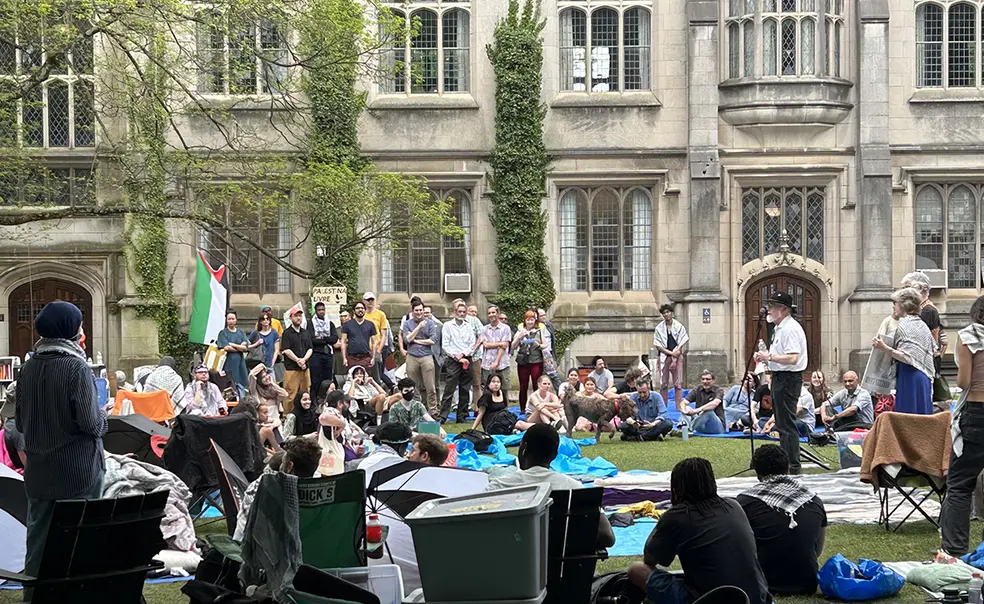On Site and Online, Protesters Find Pockets of Alumni Support
“I’m inspired by their courage,” said Bob Herbst ’69, who donned his Reunions vest at the encampment
Genevieve Yue ’01, an associate professor of culture and media at The New School in New York City, has followed the news about pro-Palestinian protests on her own campus and at colleges around the country. When she saw that two Princeton graduate students were arrested April 25 after trying to set up tents in McCosh Courtyard, she felt an urgency to speak up.
“I was thinking, what can I do in this moment?” she said.
Hours later, Yue had her answer: She resigned from Princeton’s Committee on Sexual Climate, Culture, and Conduct, an ad hoc committee of the Council of the Princeton University Community (CPUC). In an open letter published on X, she urged administrators to reinstate the two students and endorsed the demands of Princeton’s sit-in organizers. (Two graduate students and a postdoc on the committee also resigned, according to The Daily Princetonian)
Leaving the committee was difficult, Yue told PAW, because she valued the work it is doing to change the campus culture on issues such as sexual assault and harassment. But she also thought back to the lessons of the 1970 Kent State shootings, which she studied in an undergraduate seminar taught by Sean Wilentz and Anson Rabinbach.
Yue read Vice President W. Rochelle Calhoun’s letter stressing concerns about the safety of a tented encampment but was unconvinced, saying that “whatever threat that poses does not justify the level of aggressive police response.”
Alumni are supporting the pro-Palestinian protests at Princeton in a variety of ways, speaking and joining protesters on campus, arranging for food and supplies, and signing a petition to support the students who were arrested and now face University disciplinary charges (more than 150 alumni had purportedly added their names as of May 1). On social media, protest organizers have urged alumni to call or email administrators. Yue heard from Princeton friends after posting her letter, but she was not involved in any organized effort to build alumni solidarity.
Larry Hamm ’78, one of the leaders of the South Africa divestment sit-in at Nassau Hall in April 1978, spoke at the encampment on the first day outside McCosh. Political theorist Wendy Brown *83, a professor emerita at the University of California, Berkeley, who is now on the faculty of the Institute for Advanced Study, visited on April 29.
Brown, addressing the group about an hour before several protesters left to attempt to occupy Clio Hall, praised students for “your steadfastness, your grit, [and] your willingness to set aside your work” to advocate for Palestinians. Soon after, Sandy Rea ’69 and Bob Herbst ’69 spoke on behalf of “Princeton Alumni for Justice in Palestine,” a fledgling group they had started a day earlier. Chip Jerry ’69 and Marilyn Jerry s’69 also were on hand, collecting email addresses from interested alums in a pocket-sized notepad.
The University and the local community have a longstanding engagement with affairs in the Middle East, Chip Jerry said, from the Near Eastern studies department and School of Public and International Affairs to the Princetonians who’ve served in the foreign service and led the American University of Beirut. Marilyn Jerry recalled a 1988 memorial service on the University Chapel steps that honored those killed in the first year of the First Intifada. She was there with her colleagues in the Princeton Middle East Society.
“We are a town group — we always worked closely with student groups, but we never got this energy,” Marilyn Jerry said. “Finally, students are really taking matters into their own hands.”
“I’m inspired by their courage,” said Herbst, who traveled from Westchester County and wore his Class of 1969 Reunions vest at the sit-in. “These kids face doxxing, they face diminished employment opportunities, they face being smeared, because they are the ones standing up for free speech, academic freedom, and resisting genocide.”










2 Responses
Francis Allen ’76
1 Year AgoInterviews with Israeli Supporters?
Do you have an article ready with the interviews of those supporting Israel’s right to defend itself from vile, murderous attacks from Hamas? Just curious because a balanced approach to this issue seems to be the responsible one, don’t you think?
Editor’s note: For another alumni perspective, see Howard Levy ’85’s guest essay, “A View of Princeton’s Encampment from a Counterprotesting Alum.”
J. Gregory Vermeychuk *72
1 Year AgoDisruption and Occupation Are Not Protected Speech
Although I support the rights of the “protesters” to state their views in public, the occupation of University property and harassment of members of the community is unacceptable. The overarching stink of antisemitism pervades all these “protests.” How many of the people carrying signs and chanting slogans are aware of the complex history of the Middle East and the current political situation in the region? How many have watched the videos of the atrocities perpetrated by Hamas terrorists? Princeton should be a place which encourages civil and thoughtful debate rather than demonstrations which can easily devolve into violence. I was there during the student strikes of 1970 when we denounced America’s invasion of Cambodia. The climate was different, and the participants were better informed and more intelligent. We discussed the moral quandary of the war, listened to lectures given by learned historians, and calmly discussed possible solutions. In contrast, the current crop of student “activists” reminds me of mindless sheep. I am not proud to call myself a Princetonian this day.